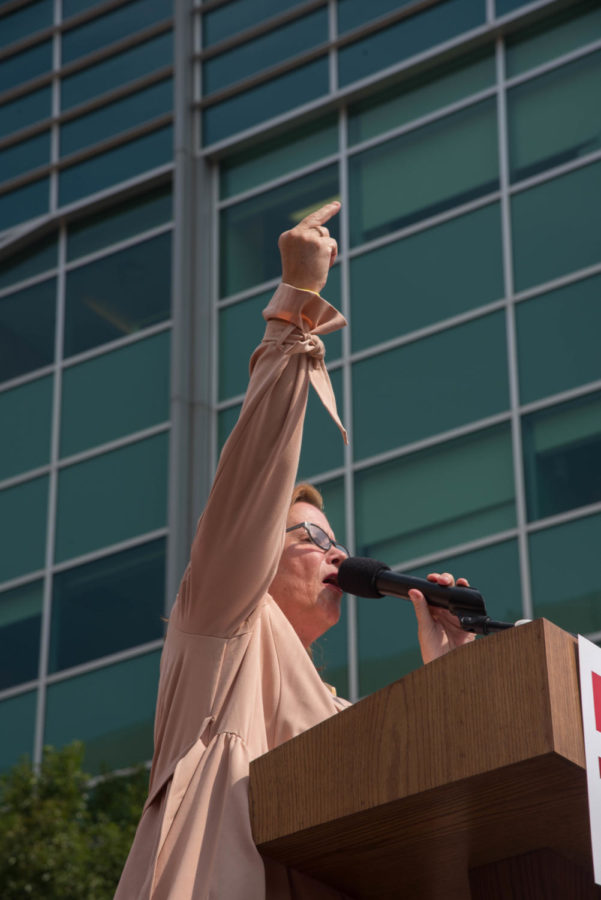Johnny Webb, a special procedures nurse and bargaining team member of the union National Nurses United (NNU), was one of 2,200 nurses who participated in a 24-hour strike outside the University of Chicago Medical Center (UCMC).
Webb and other UCMC nurses said that working overtime in understaffed conditions prevents them from providing patients the highest level of care.
“I live 62 miles away from here. I am up at four every morning to get here on time at 6:30,” Webb told The Maroon. “If I’m not out when I’m supposed to be out, I’m not getting home until 9:30–10 or later. You’re not getting your proper sleep, you’re waking up feeling tired, coming in still trying to take care of patients when you’re not 100 percent at your best.”
“There are many nights when I worked on a 28-bed unit with one assistant,” said Grazyna Cohen, a staff nurse in a general medicine unit with many oncology patients. “And this is a place where maybe 20 patients are high-risk for falling, there are many patients that have altered mental status and are confused, and many patients have challenges moving to change position.”
Nurses at the UCMC went on strike Friday morning after filing more than 1,700 complaints in the last 18 months, citing understaffing and mandatory overtime in violation of the National Labor Relations Act.
UCMC refuted many of the NNU nurses’ complaints in a press release published Thursday, saying “its nurse staffing levels are the best in the state and city — a fact that has been validated by staffing data and third-party evaluations.”
The strike comes amid ongoing contract negotiations between NNU and UCMC that began after the last contract expired in the spring. NNU filed for a one-day strike, from 7 a.m. on Friday, September 20 to 7 a.m. on Saturday, September 21.
Chief Nursing Officer Debra Albert criticized NNU nurses for being unable to reach an agreement.
“The strike has little to do with what’s happened during negotiations,” Albert said. Proposals put forth during negotiations “addressed the union’s concerns and would have resolved the staffing issue,” according to Albert, “but the union went on strike anyway.”
The scale of the strike prompted UCMC to obtain replacement nurses during the strike. Temporary nurses require contracts of at least five full shifts per nurse, leading UCMC to withhold staffing NNU nurses until Wednesday at 7 a.m.
UCMC began preparing for the strike on Monday, and on Wednesday night enacted a full bypass plan to direct all ambulances to other hospitals. Some pediatric patients were transferred to other hospitals early in the week in anticipation of the strike, some procedures were rescheduled, and the hospital limited all transfers from other hospitals.
Despite being locked out of the hospital until Wednesday, when contracts for the temporary nurses end, the nurses on strike said the work stoppage would only last 24 hours.
A public GoFundMe with a $5,000 goal was created to support nurses in the Pediatric Intensive Care Unit (PICU) and the Neonatal Intensive Care Unit (NICU) forced out of work until Wednesday. The fund exceeded its goal by Friday afternoon.
Nurses at the strike displayed nametags reading, “HELLO MY NAME IS: Shameless” in reference to an e-mail Albert sent to nurses calling the actions by nurses on strike “shameless.”
Albert said in the e-mail that union leaders should be responsible for labor negotiations and that striking places an undue risk on patients.
“Again, I think this is shameless behavior. There’s no other word for it. Shameless.” Albert wrote. “Everyone has the right to advocate for their patients and be heard. But only union leaders can stop this strike.”
Members of Graduate Students United (GSU) supported NNU nurses throughout the day. At the event’s main midday rally, Illinois State Senator Robert Peters, 10th Ward Alderman Susan Sadlowski Garza, and NNU bargaining team members stood atop a flatbed truck as a stage in front of hundreds of nurses, leading chants in support of increased staffing.
Not all nursing departments are subject to the same state regulations on patient-staff ratios. Nurses working in the NICU have state-mandated patient-nurse ratios issued by the Illinois Department of Public Health. NICU nurses stood alongside nurses from other departments.
“We felt that in solidarity, every patient deserves a safe staffing and what the NICU has,” said Terri Collins, an NICU nurse and bargaining team member.
In addition to hiring additional registered nurses, the NNU nurses are asking for more Certified Nursing Assistants (CNAs) to aid in patient care. Cohen said that CNAs are a necessary part of a nursing staff as they are able to check vital signs, blood sugar, feed patients, and help patients move.
“All we are asking for is safe staffing, because we know we will deliver excellent care and we are here for our patients,” Cohen said.









